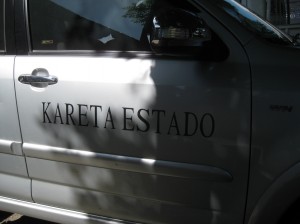Author: Sjaak Kroon (Tilburg University)
The implementation of a national language policy is more often than not accompanied by all kinds of intricacies and unforeseen problems. Timor-Leste is no exception to these occurrences, as nicely illustrated by the picture that I took in Dili, when I visited the country to participate in the New Research on Timor-Leste Conference, organised by the Timor-Leste Studies Association in 2011.
The picture shows a text that can be seen on the doors of the official car of (among others) the Director of the Instituto Nacional de Linguística (INL) in Dili. It reads: “KARETA ESTADO”.
These two words, meant to mean “state car”, refer to the fact that the car is the property of the State. If we, however, take a closer look at this text, we see that, what at first sight seemed to be a simple and easy to understand statement, has also layers of meaning that shed an interesting light on the process of language ‘policing’. Here this policing is more specifically related to the orthography of Tetun, an aspect of language policy that is generally referred to as corpus planning, i.e., making decisions on the linguistic form of a language. In Timor-Leste this is part of the activities of the Instituto Nacional de Linguística.
Looking at the first letter of the first word (‘k’ in kareta; car), one would think that the word is written in Tetun. There is, however, counter evidence to this suggestion since Tetun spelling should have been karreta with double ‘r’. (As a matter of fact, both kareta and karreta are lusisms, i.e., words of Portuguese origin; “kareta” means ‘grimace, unsweet face’; while “karreta” means ‘car of simple and small dimensions’). So, there is a necessity to keep the correct spelling using double ‘r’ for the meaning of ‘car’ (‘karreta’) and leave ‘kareta’ with the single ‘r’ as the meaning for a specific unsweet facial expression.
If we follow the decree-law 1/2004 of April 14, 2004 concerning Tetun orthography, “estado” (meaning state; borrowed from Portuguese) as well as “kareta”, is spelled incorrectly in this context since the word should have been spelled as “estadu” in Tetun.
If we have a closer look at the text as a whole, the order of words in “kareta estado” also follows the rules of Indonesian (‘mobil pemerintah’). This construction is considered clumsy in Tetun. In order to express the relationship between karreta and estadu, Tetun needs to use the possessive nia. In correct Tetun, the text on the state-owned cars of all Directors, including the Director of the Instituto Nacional de Linguística who is in charge of ‘language policing’ in Timor-Leste, should be estadu nia karreta. However, the Ministry of Finance, which owns the cars, apparently failed to have proper advice on the wording and orthographic realisation of this text.
“Kareta estado” connotes the irony normally expressed by “kafé-estadu” (two nouns joined by the hyphen in the correct spelling) which is applied to situations where ‘free of charge coffee is served’ at Timorese social gatherings, e.g. funerals, where anybody could be a guest. In this logic, the car, ‘free of charge’, could be claimed by any citizen at any time.
Source: Benjamim De Araújo e Corte-Real & Sjaak Kroon (2012), Becoming a Nation of Readers in Timor-Leste. In: Michael Leach, Nuno Canas Mendes, Antero B. da Silva, Bob Boughton & Alarica da Costa Ximenes (eds.), New Research on Timor-Leste. Dili: Timor -Leste Studies Association, pp. 336-341.
